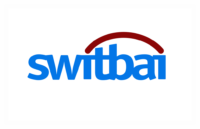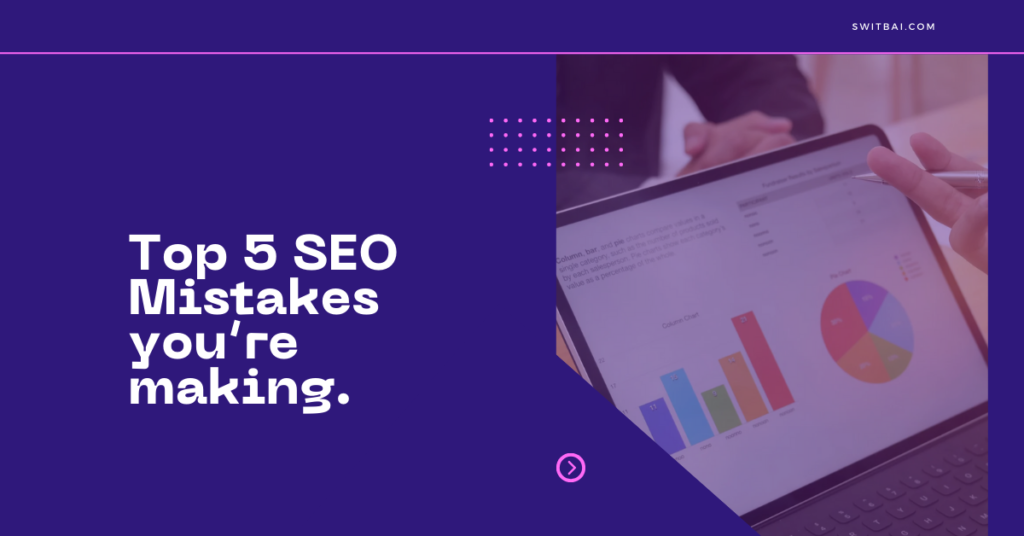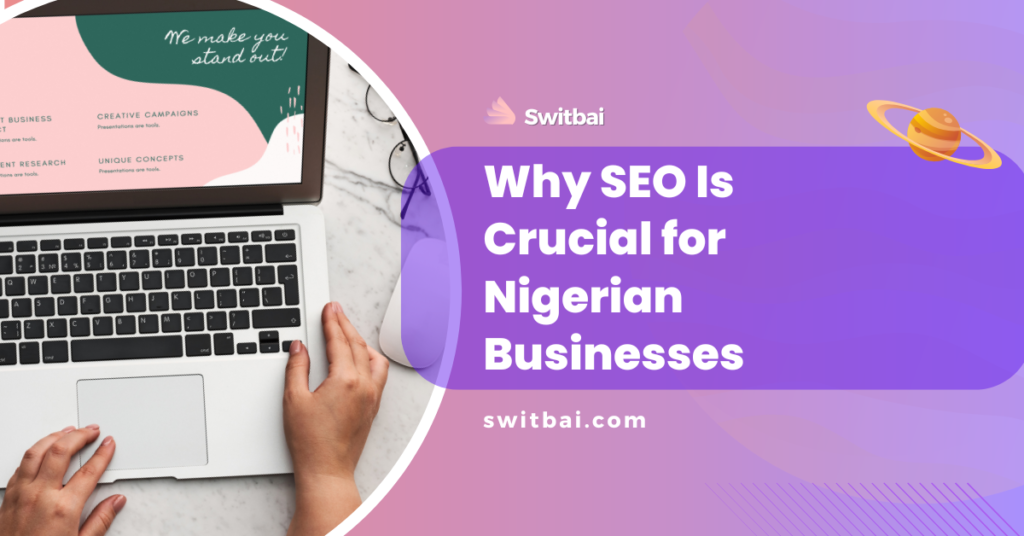In today’s competitive digital landscape, having a strong online presence is essential for Nigerian businesses. Search Engine Optimization (SEO) plays a critical role in helping your website rank higher on Google, driving traffic, and attracting more customers. However, many Nigerian businesses struggle with SEO because of common mistakes that limit their growth potential and online visibility.
These mistakes can hurt your rankings, cause missed business opportunities, and even lead to penalties from search engines like Google. But the good news is that these issues can be fixed with the right strategies. In this article, we’ll explore the top 5 SEO mistakes Nigerian businesses make and how you can avoid them to improve your website’s rankings and drive more traffic to your business.
Mistake 1: Keyword Stuffing
What It Is:
Keyword stuffing is the practice of overloading your content with keywords in an attempt to rank higher in search engine results. It used to be a common tactic back in the early days of SEO, but search engines have since become much smarter.
Many Nigerian businesses still fall into the trap of thinking more keywords equal better rankings. You might see the same keyword or phrase repeated awkwardly multiple times in a single paragraph, making the content hard to read and unpleasant for users.
Why It’s a Problem:
Search engines like Google prioritize user experience. If your content doesn’t read naturally or offer real value, it can negatively affect your rankings. Keyword stuffing can also lead to penalties, causing your site to drop in rankings or even be de-indexed. Plus, it creates a poor experience for your users, which can hurt your credibility and lead to higher bounce rates.
How to Fix It:
The solution is to use keywords strategically and naturally. Instead of overloading your content with the same keyword, focus on related terms and synonyms (this is called semantic SEO). Search engines now understand context better, so a variety of relevant words and phrases can help you rank.
Here are a few tips:
- Focus on one primary keyword per page or blog post, and use it naturally within the content.
- Use related keywords or phrases that provide context, not just the same keyword repeatedly.
- Write content for humans, not search engines. If it sounds awkward when reading aloud, it’s probably stuffed with too many keywords.
- Consider using tools like Yoast SEO or Google’s Keyword Planner to identify relevant, well-balanced keywords.
By fixing keyword stuffing, your content becomes more readable, valuable, and SEO-friendly, giving your business a much better chance of ranking higher in search results.
Mistake 2: Neglecting Local SEO
What It Is:
Local SEO is all about optimizing your online presence to attract more business from relevant local searches. For Nigerian businesses, this means optimizing for searches that include a specific location, like “restaurant in Lagos” or “plumber in Abuja.” Unfortunately, many Nigerian businesses fail to take full advantage of local SEO.
Why It’s a Problem:
Neglecting local SEO can result in missed opportunities. With more Nigerians using mobile devices to search for nearby services, a lack of local SEO means you’re less visible to potential customers in your area. Without it, your business might not show up in Google’s local search results, Google Maps, or even for “near me” searches.
How to Fix It:
To improve your local SEO, you need to focus on making your business more visible to people in your specific geographic area. Here’s how:
- Claim Your Google Business Profile: Set up and optimize your Google Business Profile (formerly known as Google My Business). Fill in all the details like business name, address, phone number, working hours, and services offered. Ensure your NAP (Name, Address, Phone) information is consistent across the web.
- Local Keywords: Use location-based keywords in your website content, page titles, and meta descriptions. For example, instead of just “website design services,” use “website design services in Lagos.”
- Get Listed in Local Directories: Submit your business to relevant local Nigerian directories such as VConnect, Business List Nigeria, or Google Maps. This increases your visibility to local customers.
- Encourage Reviews: Positive reviews on platforms like Google can improve your local rankings. Ask satisfied customers to leave reviews and make sure to respond to them, whether they are good or bad.
- Create Location-Based Content: Writing blog posts or creating service pages specific to your city or region (e.g., “Top Web Design Trends in Abuja” or “Best Cafes in Lagos”) can help attract local traffic.
By focusing on local SEO, Nigerian businesses can connect with nearby customers and boost their chances of being found in relevant searches.
Mistake 3: Ignoring Mobile Optimization
What It Is:
Mobile optimization ensures that your website looks and works well on mobile devices like smartphones and tablets. In a mobile-first world, especially in Nigeria where a significant portion of internet users access the web via mobile phones, optimizing for mobile is crucial. Yet, many Nigerian businesses neglect this important aspect of SEO.
Why It’s a Problem:
Google uses mobile-first indexing, which means the mobile version of your website is prioritized over the desktop version when determining search rankings. If your website isn’t optimized for mobile, you risk losing out on valuable traffic and rankings. Visitors may also abandon your site if it’s hard to navigate or slow to load on their phones, leading to higher bounce rates and lower conversions.
How to Fix It:
Making your website mobile-friendly involves several steps, but it’s well worth the effort. Here’s how to ensure your site works great on mobile devices:
- Responsive Design: Ensure your website uses responsive design, meaning it automatically adjusts to different screen sizes. Whether viewed on a phone, tablet, or desktop, the site should look clean and be easy to navigate.
- Fast Load Times: Mobile users expect websites to load quickly. Use tools like Google’s PageSpeed Insights to check your site’s load time on mobile devices. Compress images, reduce redirects, and minimize CSS and JavaScript to speed up your site.
- Mobile-Friendly Menus: Make sure your navigation menus are simple and easy to use on small screens. Avoid overcrowded menus or tiny buttons that are difficult to click on a smartphone.
- Test on Multiple Devices: Don’t just assume your site looks good on mobile. Test it on various mobile devices and screen sizes to ensure it’s functioning properly.
- Optimize for Touch: Make buttons large enough to tap easily, and ensure form fields are easy to fill out on mobile devices. Simplify the user experience for people navigating with their fingers.
By optimizing your website for mobile users, you’ll improve both user experience and your chances of ranking higher on Google’s mobile-first index, helping you attract more traffic and grow your business.
Mistake 4: Failing to Claim and Optimize Local Listings
What It Is:
Local SEO is all about ensuring your business is visible to potential customers in your geographic area. For Nigerian businesses, optimizing for local search is critical, as many people search for services and products “near me” or within their local community. However, many Nigerian businesses either fail to claim their local listings or don’t fully optimize them.
Why It’s a Problem:
If your business doesn’t appear in local search results, you’re missing out on customers who are ready to buy nearby. In addition, without an optimized local listing, your business might not show up in Google’s local 3-pack, which features prominently on search results pages and drives significant traffic to local businesses. Missing this opportunity makes it harder for customers to find and trust you.
How to Fix It:
Improving your local SEO requires more than just having a website. Here are key steps to make sure your business appears in local searches:
- Claim Your Google Business Profile (GBP): If you haven’t already, claim your business on Google Business Profile (formerly Google My Business). Ensure all your business details—name, address, phone number (NAP), and business hours—are accurate and consistent with your website.
- Optimize Your GBP Listing:
- Add high-quality images of your business, products, or services.
- Encourage customers to leave reviews and respond to them regularly.
- Use relevant categories for your business and include local keywords in your description.
- Add Location Pages to Your Website: If you have multiple locations, create individual landing pages for each location. Include the location name in your title tags, meta descriptions, and throughout your content.
- Local Citations: Ensure your business is listed in local Nigerian directories such as VConnect and others. Consistency is key—your NAP information should be the same across all platforms.
- Leverage Local Keywords: Use geo-specific keywords in your content. For example, instead of just “plumbing services,” target “plumbing services in Lagos” or “plumbers near Ikeja.”
- Embed a Google Map: If applicable, embed a Google map of your business’s location on your website, preferably on your contact page. This helps visitors find you easily and signals to search engines your physical presence in the area.
By improving your local SEO, you’ll rank higher in local searches, show up in Google’s local 3-pack, and attract more customers within your region.
Mistake 5: Not Creating Quality, Relevant Content
What It Is:
Publishing thin or irrelevant content just for the sake of ranking is a common mistake many Nigerian businesses make. This often includes creating articles or pages filled with generic information that doesn’t truly provide value to the reader.
Why It’s a Problem:
Thin or low-quality content fails to engage users, leading to high bounce rates and low time-on-page metrics. Search engines like Google prioritize content that adds value, and if your site is filled with irrelevant or shallow information, it can lead to penalties in search rankings. In a competitive market, having quality content is crucial for attracting and retaining customers.
How to Fix It:
- Understand User Intent: Before creating content, take time to understand what your audience is looking for. Use tools like Google Trends or Answer the Public to find out common questions or topics of interest related to your industry.
- Create In-Depth Content: Aim for comprehensive articles that cover a topic thoroughly. Longer, well-researched posts tend to rank better. Include statistics, case studies, and real-life examples to enhance the content’s authority.
- Engage with Local Content Marketing Strategies: Here are some effective content strategies tailored to the Nigerian market:
- Leverage Local Issues: Write about current events or challenges affecting your audience. For example, if you’re in the agriculture sector, create content addressing common farming challenges in Nigeria and offer solutions.
- Use Local Languages and Dialects: Cater to diverse audiences by incorporating local languages or dialects into your content. This approach can make your content more relatable and engaging.
- Highlight Local Success Stories: Share success stories of businesses or individuals in Nigeria who have effectively solved problems or achieved great results. This not only inspires your audience but also builds credibility.
- Regularly Update Your Content: Keep your content fresh and relevant. Review and update older articles with new information, statistics, or insights to ensure they remain valuable.
- Encourage User Interaction: Create opportunities for engagement by adding comment sections or encouraging readers to share their thoughts on social media. User-generated content can provide fresh perspectives and further enrich your site.
By focusing on high-quality, relevant content that addresses user intent, you can significantly enhance your SEO efforts. Not only will you engage your audience better, but you’ll also build trust and authority in your industry.
Conclusion
In summary, avoiding common SEO mistakes is essential for Nigerian businesses looking to enhance their online visibility. Key points to remember include:
- Prioritize Local SEO: Ensure your business is optimized for local searches to connect with nearby customers.
- Avoid Keyword Stuffing: Use keywords naturally within your content to maintain quality and relevance.
- Optimize for Mobile Devices: Ensure your website is mobile-friendly, as a significant portion of users access the internet via smartphones.
- Leverage Analytics: Regularly review your website analytics to understand user behavior and make data-driven improvements.
- Create Quality Content: Focus on producing high-quality, relevant content that resonates with your audience and answers their questions.
By steering clear of these pitfalls, Nigerian businesses can establish a solid SEO foundation that fosters growth and sustainability.
If you’re ready to take your SEO strategy to the next level, Switbai is here to help! Our team specializes in identifying and fixing SEO issues, ensuring your business thrives online. Contact us today to learn more about our SEO services and start your journey towards improved search engine rankings.


